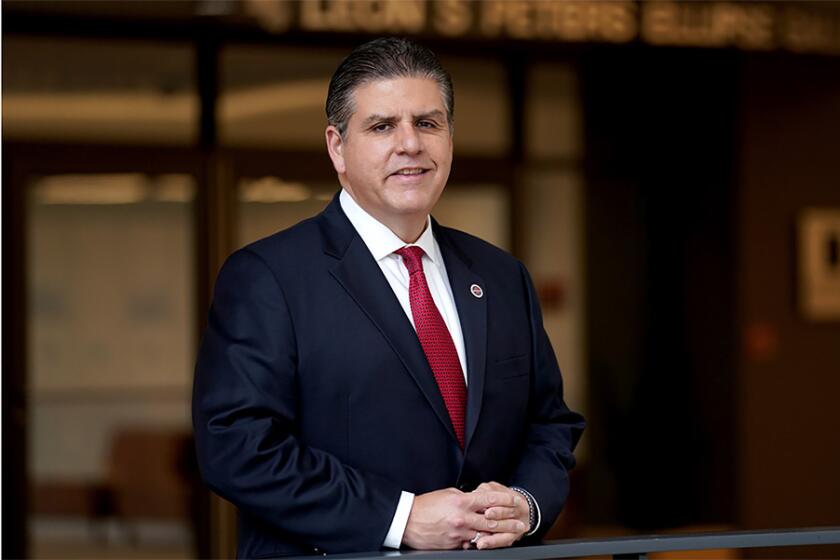Sonoma State president separates from husband amid sexual harassment, retaliation scandal

Sonoma State University President Judy Sakaki, who is facing growing criticism of her handling of sexual harassment allegations involving her husband, announced Monday that she is separating from her spouse.
Sakaki said in a statement that she was “disavowing the words and actions of my husband, Patrick McCallum,” who she said sent emails to friends and family about the allegations that Sakaki called “inaccurate and unauthorized.” McCallum is a prominent higher education lobbyist and official volunteer on the Sonoma campus who has represented the university at many events with his wife.
Meanwhile, the state senator who represents the district that includes the university issued a statement saying the scandal raises “serious questions” about Sakaki’s leadership of the Northern California campus and asked the Board of Trustees to address the matter.
“The reports are a significant distraction for the university at a critical time, and raise serious questions about her leadership and judgement,” state Sen. Bill Dodd (D-Napa) said. “It is concerning and deserves close scrutiny by the CSU chancellor and board of trustees as to how the interests of students and employees can be best served going forward.”
The developments come after a Times investigation reporting that California State University paid $600,000 this year to settle a claim with a Sonoma State provost who reported retaliation and sexual harassment allegations involving Sakaki and her husband.
CSU paid $600,000 to settle a former Sonoma State provost’s legal claim that she suffered retaliation after reporting sexual harassment by the university president’s husband.
The provost, Lisa Vollendorf, alleged that she faced retaliation from Sakaki, her boss, after she reported the sexual harassment accusations about McCallum to top officials at the chancellor’s office, records in the case show.
Sakaki and McCallum issued statements last week saying he had done nothing wrong, and Sakaki denied retaliating against Vollendorf, saying the accusations “are utterly without basis.”
At an Academic Senate meeting on Thursday, faculty voiced criticism and raised frustrations over the allegations. One faculty member asked Sakaki if her husband would still attend fundraising events. Sakaki said that a decision had not been made, but that the sensitivity of the campus would be taken into consideration.
Another faculty member told Sakaki she believed her husband owed the women who alleged harassment an apology. McCallum issued one a day later, saying: “I want to apologize to anyone who has felt uncomfortable in my presence or through my actions. It was never my intent to act disrespectfully but it’s clear that I made some people uncomfortable. For that, I’m truly sorry.”
Within days, McCallum sent out an email in which he references the “hurtful allegations” detailed in The Times’ investigation and criticizes Vollendorf, whose allegations led to the settlement, according to an email that was reviewed by Times reporters.
Chancellor Joseph I. Castro approved a quiet $260,000 payout to administrator Frank Lamas, who was accused of sexual misconduct, according to documents and officials.
The email was one of several rambling messages, including some to a Times reporter, that McCallum sent in recent days.
Sakaki said the email to friends and family was “sent without my knowledge or consent and does not reflect my viewpoint. I consider the matters between Dr. Vollendorf and me to be resolved,” she said.
“I ask for privacy and time to address these personal matters,” Sakaki added, “as I continue my service to our campus and community.”
Chancellor Joseph I. Castro’s resignation follows outcry over his handling of sexual misconduct and workplace harassment allegations while he was president of Fresno State.
The Times’ investigation detailed Vollendorf’s reports to the CSU about the allegations against McCallum.
Vollendorf said she told the general counsel in December 2018 that three women — two of them campus employees — alleged McCallum talked about his sex life, ran his fingers through one woman’s hair and then made “inappropriate personal comments” about her appearance during a party at his house, according to settlement records the provost’s attorney filed with system officials.
The women, who reported the accusations to Vollendorf because they worked for her or knew her, described the behavior as “creepy,” “disgusting” and “pervy,” the records said.
The former provost said she provided CSU officials with the names of all three as well as three more people who told her they witnessed the conduct, according to the records.
Cal State officials acknowledged that they did not launch a formal investigation into the sexual harassment claims and instead spoke to Sakaki about the accusations against her husband.
They said CSU’s former Title IX officer interviewed three people — two complainants and an apparent witness — about the allegations. One person declined to be interviewed. CSU officials said that those interviewed declined to proceed. Officials denied Vollendorf was subjected to retaliation.
Two complainants, who spoke with The Times on the condition of anonymity, said that fears of job loss and damage to the president’s reputation prompted them not to go forward. One complainant said she later told the Title IX officer that she believed Sakaki had retaliated against her over the claims.
A former interim vice president at the university told The Times that he reported similar allegations in 2019 against McCallum on behalf of his staff to general counsel Andrew Jones, but that no one followed up with him.
Gordon McDougall, who directed Sonoma State’s University Advancement Division before retiring in 2020, told The Times he changed schedules to prevent women on his team from working with McCallum during campus events following “complaints of inappropriate touching and comments.”
More to Read
Sign up for Essential California
The most important California stories and recommendations in your inbox every morning.
You may occasionally receive promotional content from the Los Angeles Times.














